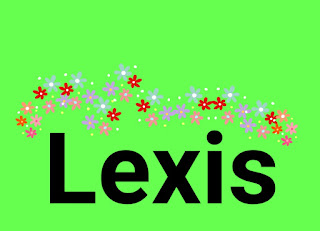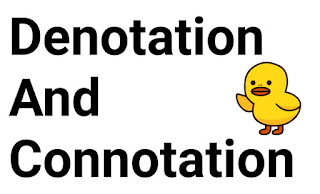LEXIS
Lexis (or vocabulary) refers to individual words or set of words which have a specific meaning.
for example: car, pick up, in the end.
WHAT AFFECTS THE MEANING OF ITEMS OF LEXIS?
Items of lexis have different types of meaning depending on the situation or context they are used in, what function (purpose for communication, e.g. giving advice) they perform and who is using them.
WHAT KIND OF MEANING CAN WORDS HAVE?
We often speak of the meaning of words. In fact words have different kinds of meaning. Firstly, there is the meaning that describes the thing or idea behind the vocabulary item, e.g. tree is a large plant with a wooden trunk, branches and leaves. This meaning is called 'denotation', and we speak of 'denotation meaning'.
Then there is figurative meaning. We speak, for example, of 'the tree of life' or 'a family tree'. This imaginative meaning comes from, but is different from a word's denotative meaning. There is also the meaning that a vocabulary item has in the context (situation) in which it is used, e.g. in the sentence 'we couldn't see the house because of the tall trees in front of it' we understand how tall the trees are partly from knowing the meaning of tall and partly from knowing how tall a house is, so the meaning of tall in this sentence is partly defined by the context.
The meaning of some vocabulary items can also come from their form, e.g. from prefixes, suffixes or compounds (nouns made from two or more separate words). Adding prefixes or suffixes to base words (the basic words or parts of a word from which other words can be made) can, for example, give them an opposite meaning (e.g. unsafe, illegal) or a comparative (e.g. easy-easier), or superlative meaning (e.g. new-newest). It may also change their part of speech (e.g. instruct-instruction, quick-quickly). The process of adding affixes is called affixation. Compound nouns get their meaning from being together (e.g. telephone number, bookshop). They have a different meaning from the individual words they are made up of.
There are also words that regularly occur together, such as collocations, fixed expressions and idioms. Collocations are words that often occur together (e.g. to take a holiday, heavy rain, arrive at, depend on). There are many words which collocate in a language, and the degree of collocation can vary. For example, watch out is a very strong collocation as these words very often occur together, whereas watch a video is less strong and watch the postmen is not a collocation. The words in watch the postmen can occur together but don't do so often enough to make them a collocation.
Fixed expressions are expressions which can't be changed (e.g. to tell you the truth, new born, it's up to you). Idioms are a kind of fixed expression as they can't be changed, but their meaning is usually different from the combination of the meaning of the individual words they contain (e.g. to be under the weather, to have green fingers, once in a blue moon). Collocations, fixed expressions and idioms are all different kinds of chunks. 'Chunks' refers to language that occur in (semi-)fixed units and that we usually learn as one piece. Have a good trip, I'd like to..., how about..., my name's... are further examples of chunks.
Words also have different relationships with one another. They may, for example be synonyms (words with the same or similar meanings) or antonyms (words with opposite meanings). They may be part of the same lexical set (groups of words that belong to the same topic area, e.g. family, furniture, food). They may also belong to the same word family (words that come through affixation from the same base word, e.g. real, really, realistic, unreal).
False friends, Homophones, homonyms and varieties of English are other ways in which words can relate to one another. False friends are very important in language learning. They are words which have the same or similar form in two languages but a different meaning. Embarazado, for example, means pregnant in Spanish. It does not mean embarrassed, though it looks as if it does to an English speaker!
Homophones and homonyms are important too in language learning. Homophones are words with the same pronunciation but a different meaning or spelling (e.g. know-no; whether-weather; there-their). Homonyms are words with the same spelling and pronunciation as another word, but a different meaning, e.g. 'they sat on the river bank', 'he put all his savings into the bank'. Words can also relate to one another through being examples of different varieties of English, i.e. different kinds of English spoken around the world, e.g. Indian, Australian, US, South African, British. These varieties sometimes affect lexis as the same things can be called by different names in different varieties, e.g. flat (British English), apartment (US English), unit (Australian English), or cookie (US English), and biscuit (British English).
Look at the examples of lexical features related to the word 'clear'(adjective)
1. Denotations - easy to understand, not covered or blocked, having no doubt
2. Synonyms - simple, certain
3. Antonyms/Opposites - confusion, untidy, covered, unsure
4. Lexical sets - well-written
5. Word families - clearly, unclear, clarity
6. Homophones - (none)
7. Homonyms - (none)
8. False friends - French 'clair', i.e. light in colour
9. Prefixes + base word - unclear
10. Base word + suffixes - clearly, a clearing
11. Compounds - clear-headed
12. Collocations - clear skin, a clear day
13. Figurative meanings - a clear head
14. Idioms - to clear the decks (to start afresh)
We can see from this example that words sometimes have several denotations. The context in which we are writing or speaking makes it clear which meaning we are using. Words can also change their definitions according to what part of speech they are, e.g. the adjective clear and the verb clear. We can also see from the example that not all words have all the kinds of form or meaning relationships.



Short post...😀👍
ReplyDeletemini introduction in the beginning.. :)
DeleteHello Ama,
ReplyDeleteNice piece of writing - I love idioms and old sayings.
Keep it up,
Kavita, Seattle
This was an excellent blog written in a easy to understand way. Thanks for posting this.
ReplyDeleteComputer Education Franchise
Education Franchise India
Computer Center Franchise
Education Franchise Opportunities in India
Education Franchise India
Spoken English Franchise
Franchise For Spoken English Classes
Top Education Franchise in India
Best Education Franchise in India